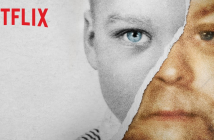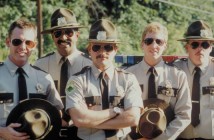
This year’s crop of Live Action Short nominees is not entirely different from the Animated Shorts, actually. There is a psychic link when it comes to the themes at play in all of these Oscar-nominated works. But whereas their animated counterparts used high-concept whimsy to explore notions of identity and the fragile state of the human condition, the Live Action Shorts are grounded studies in the desperation of humanity, how the barriers that separate us – whether said barriers are culturally implemented or self-imposed – must come crashing down when our grander human connection is at stake. Hopping across the globe, from the West Bank to Afghanistan to Germany to Kosovo to London, there are ties that bind us all together as people, even as war – be it physical, ideological, or wars of passion – threatens to tear us apart.
A snapshot of the nominees, in alphabetical order:
Ave Maria
Easily the lightest-hearted of the nominees, Ave Maria nevertheless tackles one of the longest-standing culture wars of our time – albeit with a cleverly light touch. At a desolate West Bank monastery, five nuns prepare for a day of silence and prayer when they hear a crash just outside. A family’s car has broken down and wrecked – tragically – into the statue of Mary planted outside the facility. As fate would have it, the crash comes at the hands of an Israeli family. So Catholic Palestinians who have taken a vow of silence clash with Jewish Israelis who can’t use technology, since it’s the Sabbath. Cute, right? And it is, in small doses…which is saying something in a film that runs short of 15 minutes. The Jewish patriarch can’t hold the phone, so he asks the nun to hold it to his ear while he attempts to call a cab. The nuns can’t speak, but they may have the right tools to get the car jumpstarted. It’s a clever conceit to bring these two warring cultures together in a gently madcap manner and watch them first sidestep, then plow through the rigidity of cultural norms to help each other on a human level. But it’s a little too thin to hold our interest – even within a short context.
Day One
Here we start a plunge into a more serious consideration of cultural boundaries and human inevitability. Day One charts an intensely eventful first day on the job for Feda (Layla Alizada), an interpreter working with the US Army in Afghanistan. While her unit searches the home of a suspected bomb-maker, the suspect’s pregnant wife goes into labor. Cultural restrictions prevent even the unit physician from entering the room and assisting in the birth, so they turn to Feda to carry out the procedure. Complications abound – no modern technology is present, no professional assistance is available, and the baby is breech, putting both its life and the mother’s in peril. Director Henry Hughes, himself an Afghanistan vet, ratchets tension to a fever pitch as Feda is forced into a scenario in which she must be the steady, calming influence, despite the fact that, on her first day, she’s been placed directly into the eye of the storm. The film stumbles at the end, when it isn’t quite sure how to resolve itself, nor what its resolution implies going forward, but when at its best, Day One is riveting.
Everything Will Be Okay (Alles wird gut)
The title phrase becomes a futile mission statement in Patrick Vollrath’s film, which could most easily be categorized as a thriller but carries far greater weight than such a simple genre descriptor could convey. Michael (Simon Schwarz) is a divorced father who arrives for his scheduled visitation with daughter Lea (Julia Pointner) looking somewhat ragged and skittish. He seems the very depiction of an unreliable father – the love is there but the selflessness isn’t. What starts as a standard, engaging day-in-the-life portrait – father and daughter visit the toy store, play on bumper cars, make silly faces at a photo booth – slowly reveals itself as something much darker. Each activity seems linked to a veiled plan; Michael has something up his sleeve. And young Lea – bright-eyed but clearly not naïve to her father’s ways – picks up on it soon enough. Vollrath develops gut-wrenching tension of the what-could-possibly-happen-next variety, and we eventually succumb to the realization that, regardless of how this scenario plays out, everything certainly won’t be okay – especially not for Lea, who only wanted a day full of toys, candy, and bumper cars.
Shok
Set in 1998, in the midst of war-torn Kosovo, Jamie Donoghue’s film is about naivete of youth, the boundaries of friendship, and the lasting weight of guilt. Petrit (Lum Veseli) and Oki (Andi Bajgora) are best friends whose bond is tested under the confines of the Serbian occupation. The horrors of militarization and racism are explored to tragic ends, leading to a gut-punch of a catharsis that is rendered masterfully by Donoghue, whose filmmaking is impeccable from first frame to last. The story, however, strikes me as obvious and heavy-handed, particularly in short form; there is a feature-length version of Shok that could be a coming-of-age masterpiece. As it currently stands, it feels like the narrative was crammed into a one-note vignette. Nevertheless, it’s pristinely cinematic, and that may be enough to carry it over the top with Oscar voters.
Stutterer
Benjamin Cleary’s film is a quirky character study, one that sometimes veers into too-cute territory in terms of its conceptual presentation, but is nevertheless a smart, affecting, and deeply felt. Greenwood (Matthew Needham) is incredibly verbose and endlessly eloquent – except he rarely speaks out loud, since he suffers from a debilitating stutter. In extended inward monologues, we learn who Greenwood really is – deeply contemplative, keenly observant, hopelessly romantic…and resigned to his antisocial fate thanks to his crippling affliction. His lifeline is an e-relationship with Ellie (Chloe Pirrie), but the prospect of meeting her face-to-face scares Greenwood further into lonely oblivion. Cleary’s style is sharp both in terms of dialogue and visual panache…sometimes a little too sharp by half. But his story – simple in content and more complex in execution – is deeply humane, sneakily powerful, and, by the end, surprisingly charming.
In terms of predicting a winner, I don’t think this is a runaway contest. Everything Will Be Okay is clearly the best, although maybe that’s just from my unique POV. Day One is powerful, and the only film to offer an American perspective. Stutterer is sweet and relatable. But Shok seems to be the standard bearer of the group. Its narrative is squarely on the nose, but it carries immense weight and its filmmaking is undeniable.
Overall, another good year for Live Action Shorts. In totality, this year is better than the last, though none of these films is quite as powerful or engaging as last year’s best offering, Talkhon Hamzavi’s Parvaneh (though for the record, they’re all better than The Phone Call, last year’s eventual Oscar winner). But each is essential viewing, five more examples of how the short categories offer cinema just as vital as the more prominent features.



